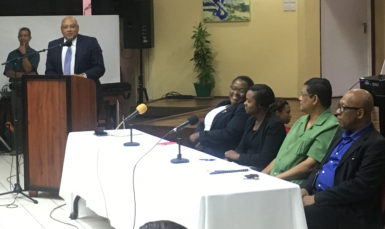Government does not expect that there will be any oil spills when ExxonMobil begins drilling offshore Guyana, but will be prepared if any occur, Minister of Natural Resources Raphael Trotman said on Thursday.
Speaking at the Ministry of Natural Resources’ first stakeholder engagement session at the University of Guyana (UG), Trotman said in response to a question on the issue, “Only today [Thursday] we had a very long presentation on this very matter.” He explained that in the event of such an actuality, the company itself is obligated, by contract and its own laws elsewhere, to be the first respondent. “Exxon is obligated, the CDC [Civil Defence Commission] has already starting gearing up and the CDEMA [Caribbean Disaster Emergency Management Agency]…,” he added, while pointing out that training is also being done with the US Coastguard.

Asked about a spill contaminating the local waterways, Trotman pointed out that according to the data, because the operation will be some 123 miles offshore, even a month of slick would not come close to the shore.
He told the audience, prior to being bombarded with questions that while the ministry had spent the last two years accepting the fact that oil was found and preparing for the eventuality, it wanted to note the various angles and perspectives that Guyanese have. “It became quite evident that before we go further we needed to let the people know what we know and what they would like us to know so as far as the management is concerned,” he said, adding that the ministry thought there was no other place to begin such a conversation that the university, which is expected to play a key role in the sector.
During his presentation, Trotman referenced the Kingdom of Norway, which is said to be greatly assisting the country in the venture.
One of the questions posed was how they were going to ensure that politics remained separate from the extractive industry and the sovereign wealth fund.
“There are 21 principles known as the Santiago principles that should be contained in every sovereign wealth fund,” Trotman responded. “We have ensured that in our drafts we have met all 21. We have taken our draft primarily from the ones in Uganda and Kenya both of which were assisted by Norway when they were formed.” He said that they have advised the Commonwealth Secretariat that they need the laws to reflect the Norwegian presence because Norway “stands out as the standard we must aspire to be.”
In addition to meeting the 21 principles, he said, some of the features include having no Minister, President or Prime Minister being able to enter into the fund without the consent of Parliament. He said there will also be constant audits done locally and internationally and there will be an advisory board of finance experts.
Questions about the possibility of having a refinery and employing Guyanese were also posed to Trotman, who related that a solid decision has not yet been made since they have received offers from both Suriname and Trinidad and Tobago to refine the oil. “… They have built refineries which are now running below optimum and so we have to look at the economics of it,” he said, while explaining that the government has to see whether there would be an industry outside of the Liza well and if they would be able to sustain a refinery after 20 years.
With respect to the natural gases coming from the well, he added this was supposed to be reinjected into the area to ensure the pressure is kept at a constant level. However, he has since charged the company to ensure that it is never flared, which he said is a no, no to the government. “As of last week we have been advised that there is sufficient gas to power 200MW of power for 20 years if we want it,” he noted. However, the decision has not yet been made.




